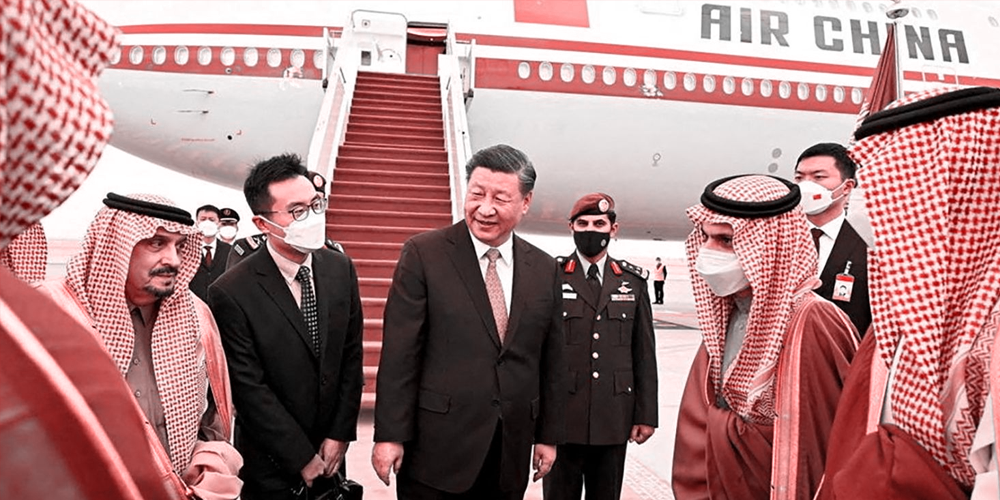Recently China made a bond sale in Saudi Arabia. While perhaps not particularly notable on the surface, if we dig a little deeper, we can see some signs of China’s broader geopolitical goals being played out. China has long called for a global system of cooperation, based on the UN charter, whereby nations respect each other’s sovereignty and no one country wields excessive influence. In today’s world, that role is occupied by the US, supported by its imperialist excursions. This is all made possible, however, by the petrodollar currently being the de facto global currency. I wrote previously about the possible emergence of a petroyuan[1], but this bond sale indicates that China perhaps has other ideas in mind, ideas that might both upset the hegemony led by the US and empower the Global South.
Trump launched a trade war with China in 2018 in a bid to boost the US’ flagging domestic industrial productivity. Some China watchers predicted doom for several of China’s sectors, including its semi-conductor chip industry. However, as they invariably are, these predictions were wide of the mark, and the enforced challenges drove innovation to such an extent that China may soon lead the world in this sector. Nonetheless, China has clearly seen that the US’ trade war and overall belligerent attitude isn’t changing any time soon so is looking for ways to de-dollarize – or perhaps to be more accurate, re-dollarize.
The US treasury issues bonds (called Treasurys) that are highly sought after, AAA-rated securities. It’s ability to issue bonds that are so desired means it can leverage enormous national debt while remaining economically stable. The high rating for these bonds reflects the belief that the American economy is a “sure bet” for investors. However, in its recent bond sale to Saudi Arabia, China was able to issue bonds at rates that were just 1 to 3 basis points higher than US Treasurys’. These rates, close to identical to the US, led to huge demand – they were oversubscribed by 20 times the amount available.
Arnaud Betrand, a commentator on China’s politics and economy, wrote on X.com: “By issuing dollar bonds in Saudi Arabia that compete directly with US Treasurys, and getting essentially the same interest rate, China is demonstrating it can operate as an alternative manager of dollar liquidity right in the heart of the petrodollar system,”
If China can issue bond denominated in dollars that is as sought after as the US’ own Treasurys, this could lead to the US increasing interest rates to remain competitive and its national debt could go from being a strength to a fatal weakness.
But what benefit is it to China to hold billions of dollars? This is where China’s strategy could have an impact on the Global South, as Bertrand continues:
“This is where China’s strategy could become truly clever. China could use its US dollars to help Belt & Road countries pay off their dollar debts to Western lenders. But here’s the key: in exchange for helping these countries clear their dollar debts, China could arrange to be repaid in yuan, or in strategic resources, or through other bilateral arrangements.”
Through these dollar-denominated bond sales, China could achieve three positive outcomes. First, it would weaken the US’ position and the strength of its ability to issue Treasurys to finance its domestic and international terrorism. Secondly, China could give the dollars to countries in the Global South along the Belt & Road Initiative (BRI) in return for yuan or trade agreements (which these countries can then use to clear their debts without being dependent on western-backed global monetary bodies like the IMF). Thirdly, as the country that holds the largest amount of dollars in the world, China’s ability to rid itself of its excess dollars would frame this as a “triple win” for the country.
It is still early days, and it remains to be seen whether this is a “warning shot” or part of a permanent long-term strategy. Nonetheless, as should be apparent to students of dialectics, China has found a way to synthesise the tension between the petrodollar and those that suffer under its hegemony that could lead to an emergence of a new economic order.
[1]Farrell, A (2023) “The emergence of the Petroyuan: towards a new global currency” Socialist Voice website, accessed on 31/12/2024: https://socialistvoice.ie/2023/12/the-emergence-of-the-petroyuan-towards-a-new-global-currency/






